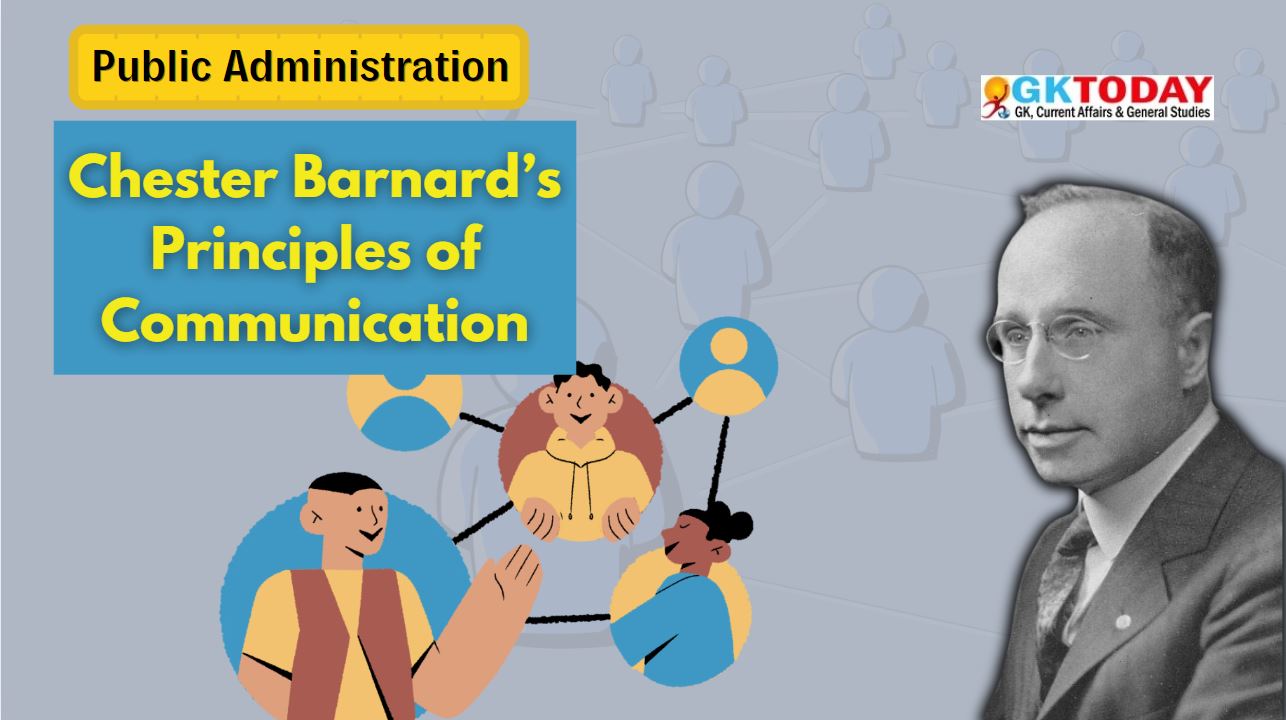Chester Barnard’s Principles of Communication [UGC NTA NET Political Science Notes]
Chester Barnard (1886-1961) was an American business executive and public administrator. He served as the president of New Jersey Bell Telephone Company. His vital information about management and organisational behaviour emerged from practical experience. Barnard’s work has become foundational in the field of organisational communication. His work, particularly “The Functions of the Executive,” has shaped our understanding of organisational communication.
Key Principles of Communication
Barnard articulated several principles that underpin effective communication within organisations. These principles serve as a guide for managers and leaders in encouraging a productive communication environment.
Communication as a Function of Management
– Effective communication is vital for organisational success. – It facilitates coordination and cooperation among members. – Managers must ensure that communication flows smoothly to achieve goals.
Importance of Informal Communication
– Informal communication channels are as crucial as formal ones. – These channels enhance understanding and build relationships. – Examples include casual conversations and social gatherings.
Role of Authority in Communication
– Communication should flow both top-down and bottom-up. – Leaders must convey directives clearly. – Employees should feel comfortable sharing feedback.
Clarity and About
– Messages must be clear to prevent misunderstandings. – The sender is responsible for ensuring the receiver comprehends the message. – Using simple language can enhance clarity.
Feedback Mechanism
– Feedback is essential in the communication process. – It allows for the assessment of message effectiveness. – Constructive feedback can lead to improvements in communication.
Communication as a Social Process
– Barnard viewed communication as an interactive social process. – It involves not just information transmission but also relationship building. – Successful communication encourages a collaborative environment.
Principle of Acceptance
– For communication to be effective, the receiver must accept the message. – Acceptance is influenced by the sender’s credibility. – Relevant messages are more likely to be accepted.
Communication and Organisational Goals
– Effective communication aligns individual efforts with organisational objectives. – It creates a shared understanding among members. – Clear communication of goals enhances productivity.
Barriers to Effective Communication
Barnard identified several barriers that impede effective communication within organisations.
Physical Barriers
– Distance and noise can hinder communication. – Environmental factors, such as layout, can affect message delivery. – Solutions include using technology to bridge gaps.
Psychological Barriers
– Prejudices and emotions can distort message interpretation. – Attitudes towards the sender influence reception. – Training can help mitigate these barriers.
Semantic Barriers
– Misinterpretation of language can occur due to jargon or cultural differences. – Clear definitions and context are essential. – Encouraging questions can clarify misunderstandings.
Organisational Barriers
– Hierarchical structures can restrict information flow. – Bureaucratic processes may delay communication. – Flattening structures can enhance communication.
Communication Channels
Barnard distinguished between formal and informal communication channels, both vital for organisational communication.
Formal Channels
– Established pathways for communication include reports and memos. – Meetings are a common formal communication method. – These channels ensure documentation and accountability.
Informal Channels
– Unofficial means of communication include casual conversations. – Social interactions can lead to valuable insights. – Informal networks often enhance trust and collaboration.
The Role of Leadership in Communication
Effective leadership is crucial for encouraging a healthy communication environment.
Modelling Effective Practices
– Leaders should exemplify good communication practices. – Transparency and openness encourage dialogue. – Leaders must be approachable to facilitate communication.
Encouraging Open Dialogue
– Leaders should create a culture where feedback is valued. – Regular check-ins and open forums can promote discussion. – Encouraging questions encourages a learning environment.
Application of Barnard’s Principles
Barnard’s principles have practical applications in various fields.
Organisational Development
– His principles are used in training programmes for managers. – Effective communication strategies are integral to organisational development. – Workshops often incorporate Barnard’s insights.
Public Administration
– Barnard’s ideas apply to public sector organisations as well. – Effective communication is essential for policy implementation. – Public administrators can enhance service delivery through his principles.
Influence on Modern Management Theories
Barnard’s contributions have left a lasting impact on management theories.
Foundational Ideas
– His work laid the groundwork for later theories on organisational behaviour. – Concepts of communication and leadership have evolved from his principles. – Modern theories often reference Barnard’s insights.
Contemporary Practices
– Barnard’s principles continue to influence current management practices. – Communication strategies in organisations reflect his ideas. – His emphasis on feedback and clarity remains relevant.


